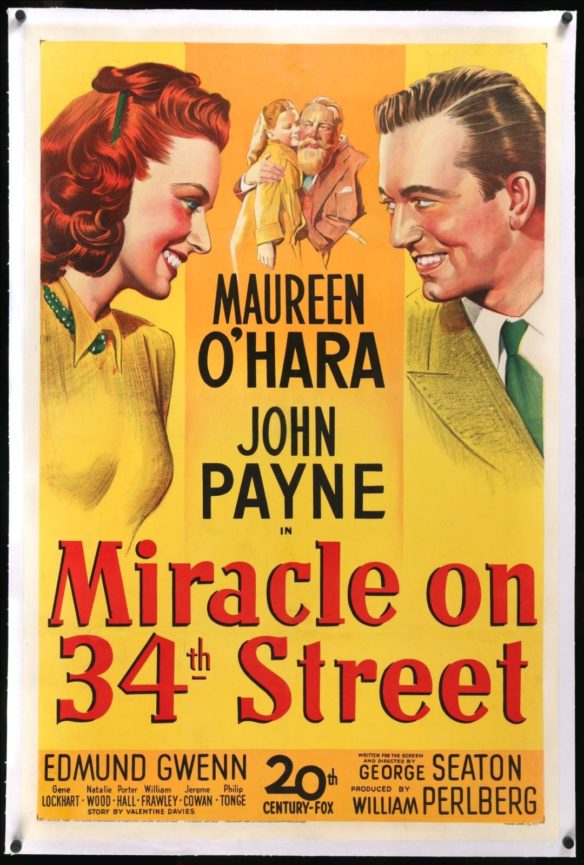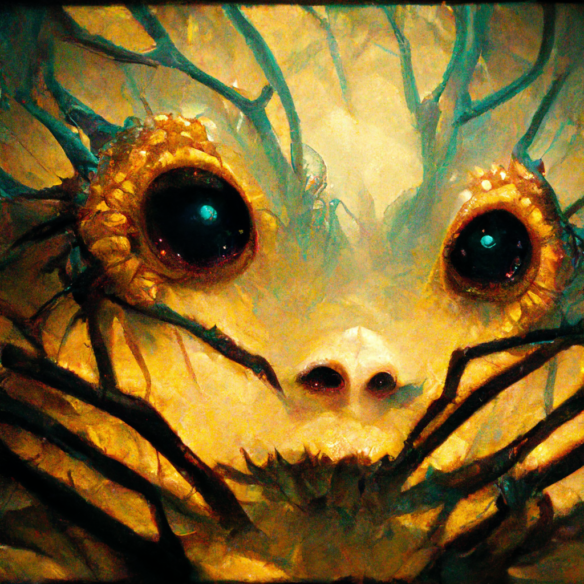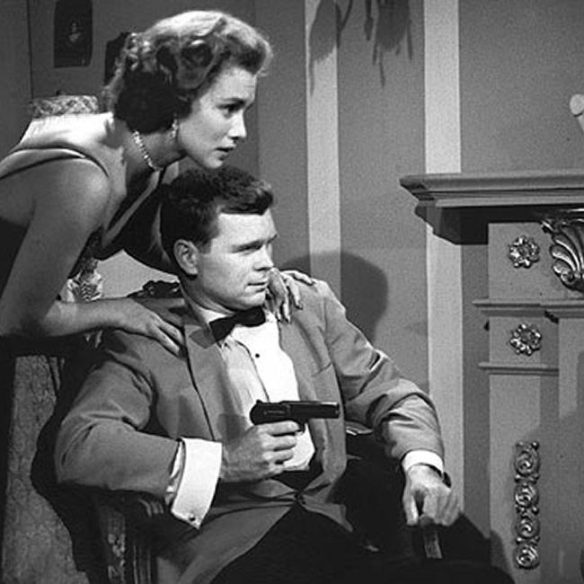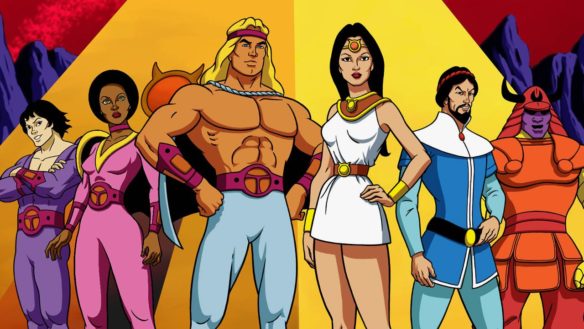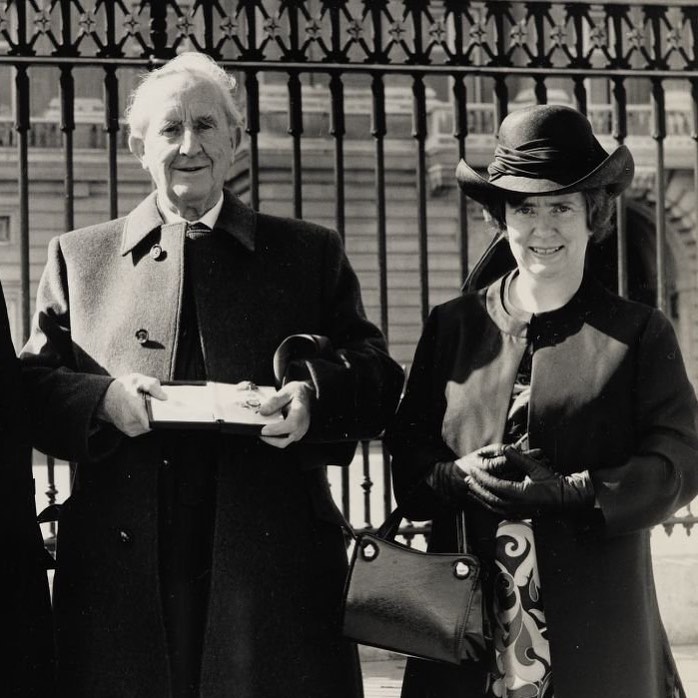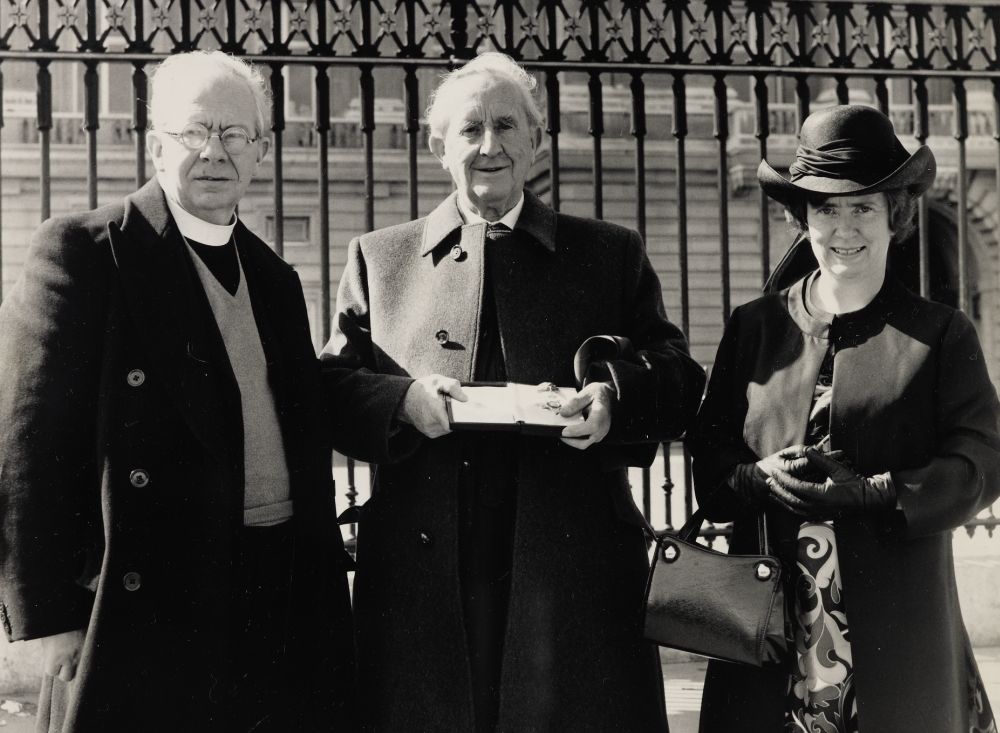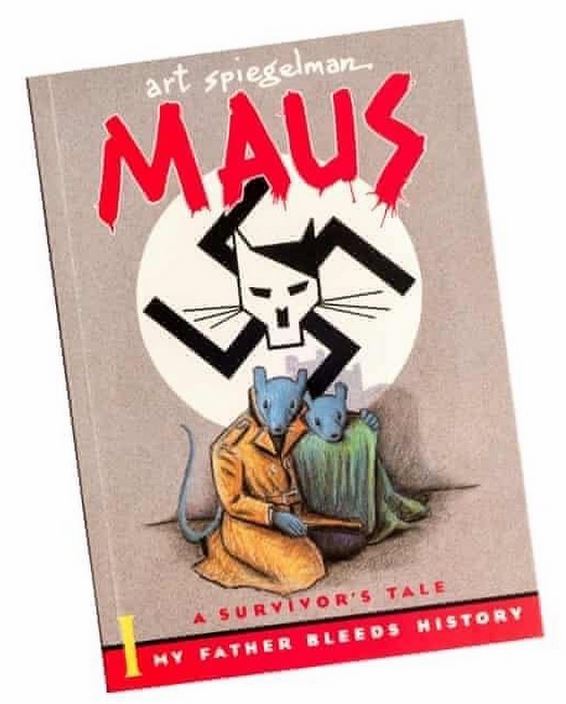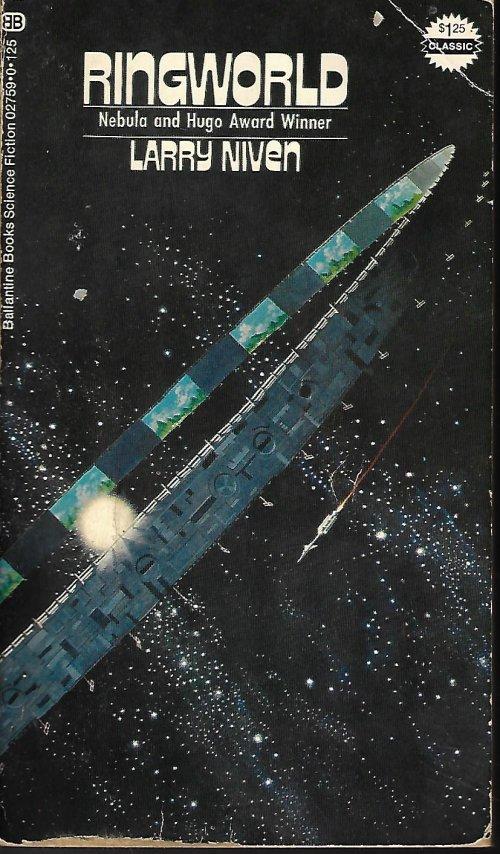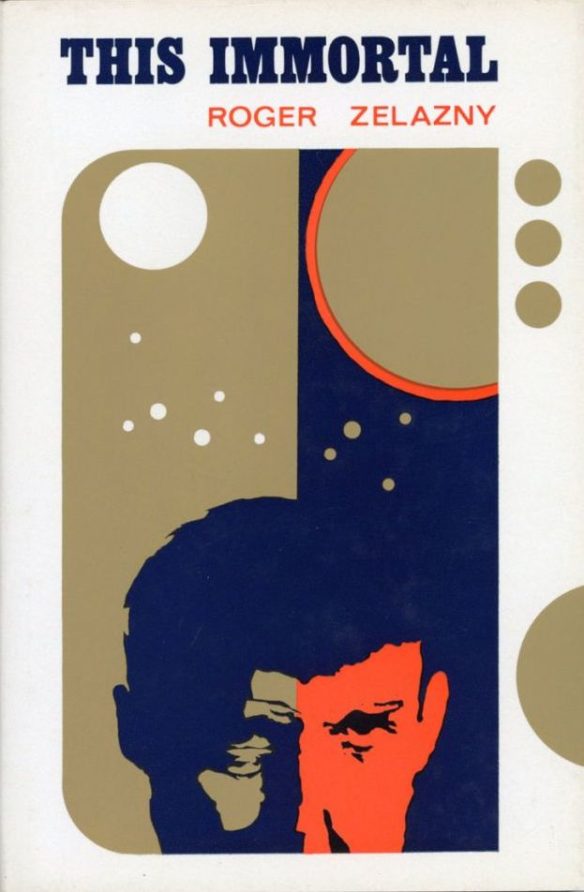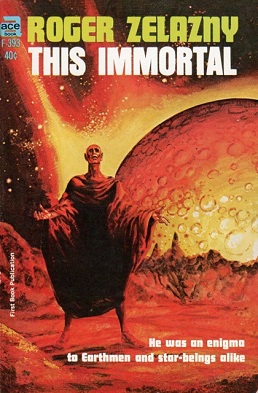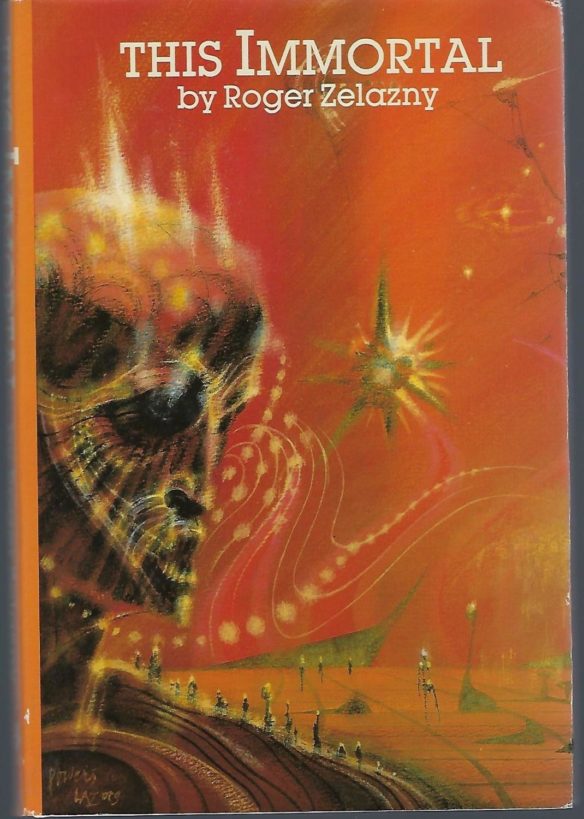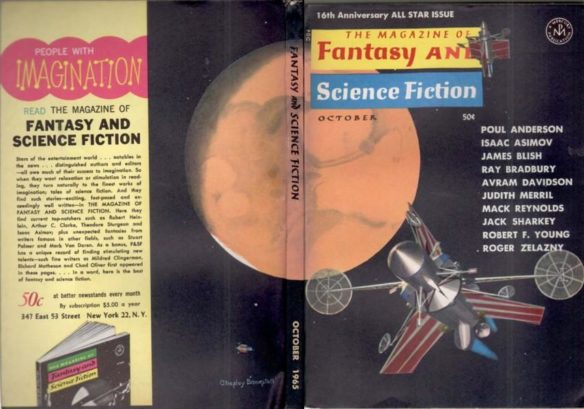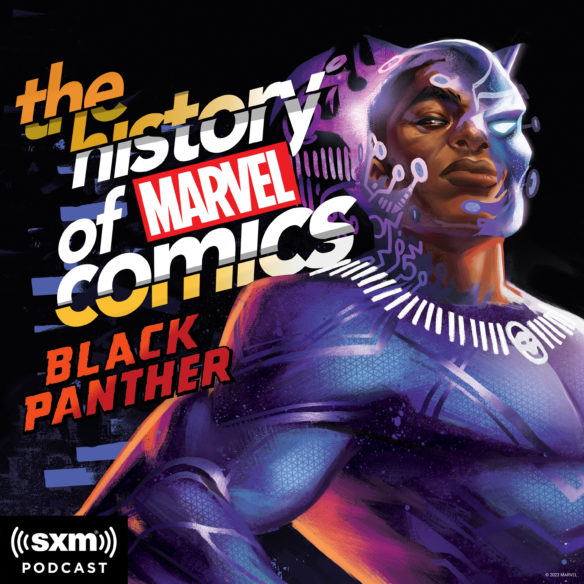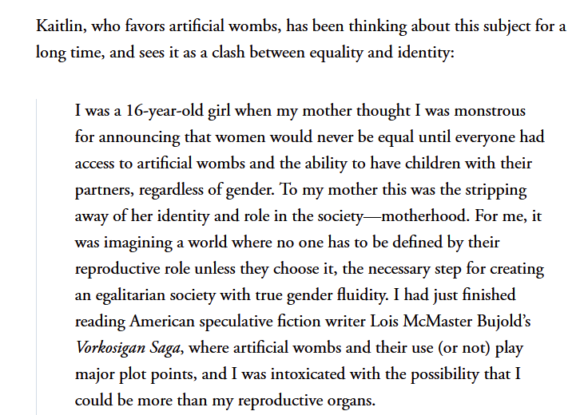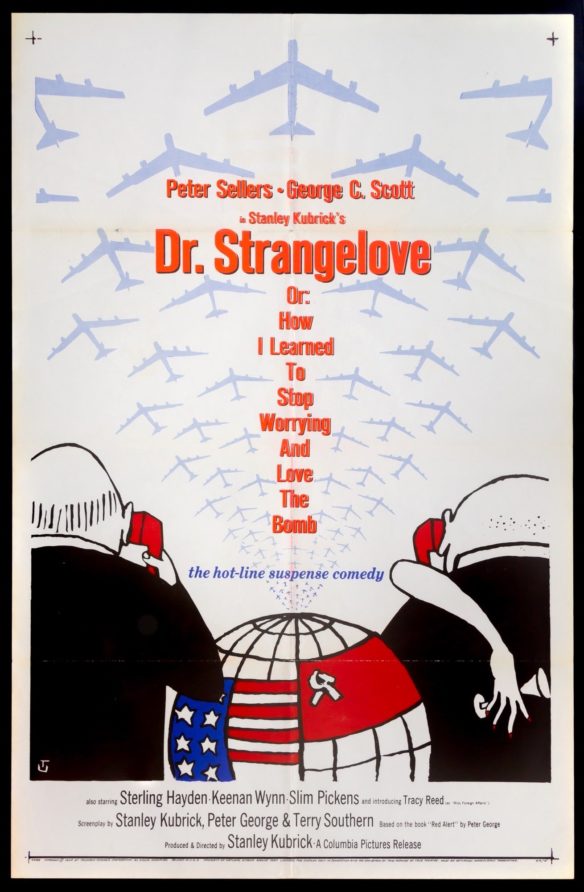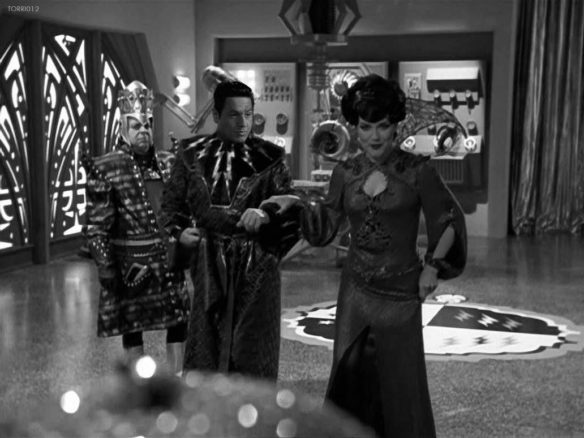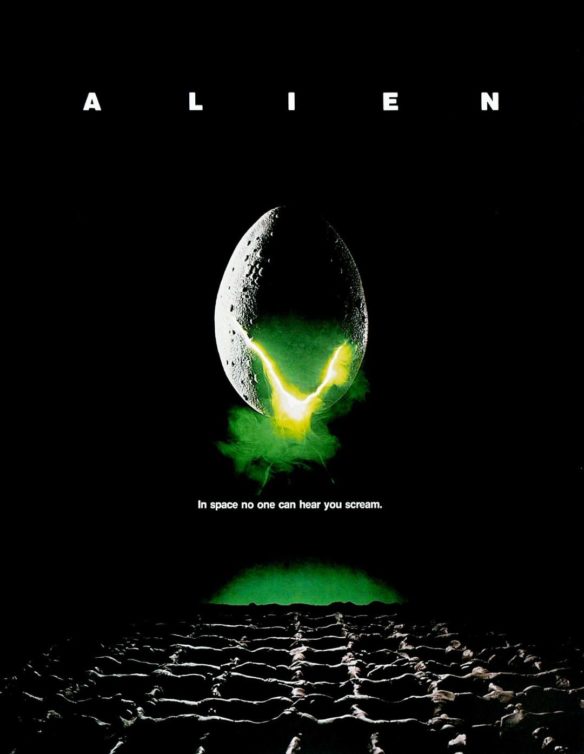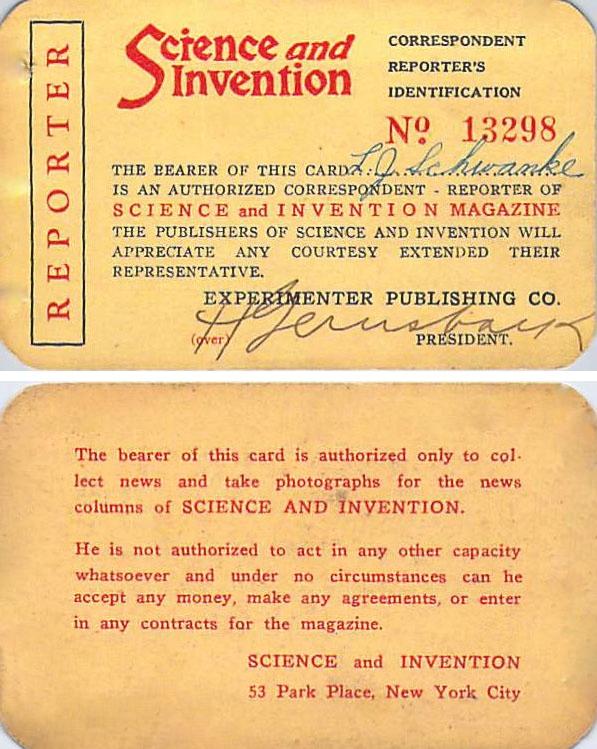(1) CHARTING THE DECLINE OF SFF MAGAZINES. Steve Davidson of Amazing Stories has shared a graph on Facebook showing decade-by-decade the number of sff magazine titles and issues since 1923. The numbers really drop off as they approach 2023, as you might guess. Now you can see it, too.
Steve followed up with a deep dive into the costs of producing a print magazine today, something both fascinating and sobering.
(2) PREVIOUSLY UNSUSPECTED PRATCHETT. A Stroke of the Pen: The Lost Stories is a new collection of Terry Pratchett shorts. Where did they come from? Big Issue has the inside story: “Terry Pratchett: Remarkable way lost stories were found by fans”.
…Following the posthumous release of his final few novels, there could never again be a new Terry Pratchett book.
Until now.
A Stroke of the Pen: The Lost Stories, published this week, compiles short tales written by Pratchett for newspapers in the ’70s and early ’80s and not republished since. It’s not the first such collection – before he died, Pratchett himself approved several volumes of his early tales, originally published in the Bucks Free Press newspaper where he wrote children’s stories under the inherited nom-de-plume ‘Uncle Jim’. The Lost Stories are different, though – until last year, nobody knew they existed.
“It always puzzled me why his inspiration for writing short stories dried up in the mid ’70s”, says Colin Smythe, Pratchett’s friend and publisher, who would become his literary agent when the Discworld novels found success in the ’80s. “It turns out it had not.”…
(3) REVIEW OF ‘THE LOST STORIES’. SF author Adam Roberts analyzed the collection for the Guardian: “A Stroke of the Pen by Terry Pratchett review – newly discovered early stories”.
…The best stories have sparks of originality that, the reader wishes, could have been kindled into greater length. The Fossil Beach starts from the premise that putting a fossilised seashell to your ear enables you to hear a prehistoric ocean, spinning a neat and funny little time-travel comedy from that notion. The collection’s final story, The Quest for the Keys, is the best as well as the longest. It opens in “Morpork” – not exactly the Discworld’s Ankh-Morpork, but a more thinly rendered “evil, ancient, foggy city” – where a disreputable wizard, Grubble the Utterly Untrustworthy, sends the none-too-bright warrior Kron on the titular quest. It rattles along, and is liable to remind the Pratchett fan of The Colour of Magic. But it only confirms what the collection as a whole says: that this is a writer on his way somewhere more interesting….
(4) COSTLY VANITY. Victoria Strauss warns “Vanity Radio and TV: Think Twice Before Paying for Interviews” at Writer Beware.
… What’s vanity radio/TV? In the “writer beware” context, it’s radio or television air time that you, the program guest, have to pay for. Such schemes have been around forever in various forms, aimed at experts and creatives of all kinds, from services that explicitly sell pay-to-play interviews, to show hosts that charge interview fees to defray the fees that they themselves have to pay their platforms.
The main selling point is the promise that your interview will be heard by a large and eager audience, giving wide exposure to you and your book (see the pitches screenshotted below).
In reality, though, vanity radio primarily means local AM/FM stations (not national radio), often in obscure time slots; or internet radio broadcasts and podcasts delivered via platforms like Blog Talk Radio, Spreaker, and streaming services such as iHeart Radio. Internet radio listenership has steadily risen over the last decade and a half, but unless there are subscriber lists (as on YouTube, for instance), there’s usually no way to determine the audience for any given host or show–or to authenticate any listenership claims the show may make.
Ditto for vanity television: interviews may appear on local channels–again, often at times when viewership may be low–but are most often delivered via “sponsored content” internet stations such as The Spotlight Network, or proprietary online “channels” like Daily Spark TV, or “cable alternative” apps like TikiLIVE, which provide no reliable way of verifying audience.
Bottom line: lots of people may be tuning in…or no one at all. Which means that that the only benefit authors can be sure they’ll receive for their money is an audio or video clip they can post to their websites and social media accounts.
Whether that’s worth it when it costs $99 or $150 or $200 is debatable enough. But when the price tag is four figures?…
(5) CHENGDU WORLDCON ROUNDUP. [Item by Ersatz Culture.]
Crowdsourced spreadsheet of panel members
This Chinese-language online spreadsheet shows in red the members of panels/events, where those people or organizations have publicly posted about them. The Weibo post announcing it indicates that it is open to submissions for the missing information – if anyone has info, if you post a comment here, it will be seen and added to that spreadsheet. NB: the information may not be 100% correct due to late cancellations and the like.
CSFDB activities at the Worldcon
A weixin.qq.com post by the Chinese Science Fiction Database linked from the aforementioned Weibo post provides full details of their activities, including a panel whose members include Sanfeng (aka Feng Zhang) and Arthur Liu, both of whom have contributed posts or commented here at File 770. The post states (via Google Translate):
Note: Translation and video recording will be provided for this event, and we will produce a Chinese and English subtitled version after the event.
I asked Arthur Liu, and he said those recordings and subtitles are something that the CSFDB team are providing off their own back. It’s still unclear what exactly the con will be providing via official streams and the like.
34th Galaxy Awards shortlist
I’m not sure if this shortlist is new information, but it doesn’t look to have been previously covered on File 770. Hugo Best Short Story finalists “On the Razor’s Edge” and “The White Cliff” both make an appearance, as do the western works Love, Death and Robots (an anthology of the adapted stories, I think), Ken Liu’s Good Hunting (I think this is a collection including the titular story), Stanislaw Lem’s The Star Diaries and a Roger Luckhurst non-fiction book.
The award ceremony is on Thursday 19th at the Sheraton across the lake from the Worldcon site.
Successful lottery applicants have been notified
My searches for relevant Xiaohongshu posts today were dominated by successful applicants to the lottery for the three ceremonies. From this incredibly unscientific sample set, it seems like the Hugo ceremony was most popular, followed by the opening ceremony. I only found one post showing attendance for the closing ceremony.



Another view of the Hugo rocket decoration
This Xiaohongshu post has a few images of the interior of the museum, including a wider angle view on the Hugo rocket that was in yesterday’s Scroll. It doesn’t look that impressive at first glance, until you notice the tiny human figure under it…
Venue video
The Chengdu Worldcon committee has posted a video on Facebook with many interior views of the décor of the building where the con will be held.
(6) OVERSIGHT. Hugo Administrator Dave McCarty has arrived in Chengdu and on Facebook has shared photos of the view of the Chinese Science Fiction Museum from his hotel room window.
(7) WE HAVE LIFTOFF! And Chris Barkley took off for China this morning after sending us this photo message: “Well, it’s HAPPENING. Tell my fellow Filers that I will be safe and I’ll TRY to behave.”

(8) ICONOCLASTS. Michael Cava tells Washington Post readers that “Art Spiegelman didn’t expect to become a book challenge warrior”. Much of the interview is in comics form – art and word balloons.
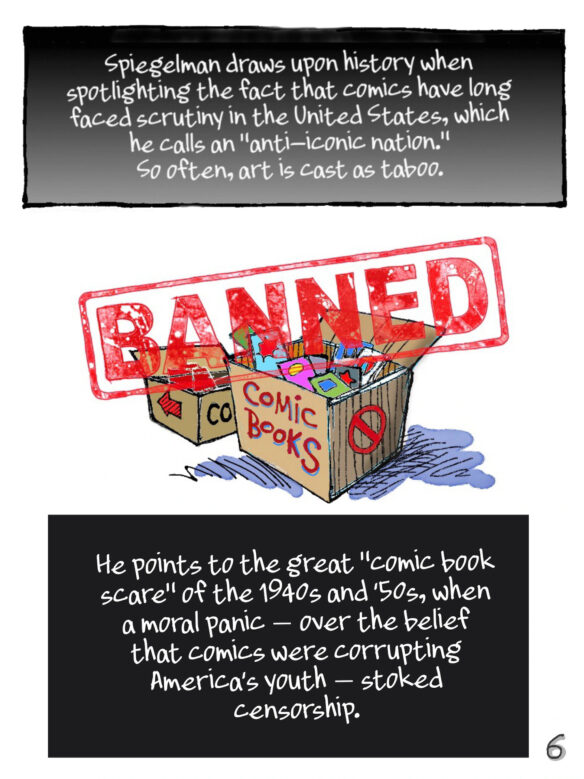
(9) SIMULTANEOUS TIMES. Space Cowboy Books has launched Episode 68 of the Simultaneous Times podcast. Stories featured in this episode are:
- “This is an Optimistic Science Fiction Story About the Future” by Marie Vibbert. Music by Fall Precauxions
- “Space Radio” by Michael Butterworth. Music by Phog Masheeen
- “Space Age Mermaid” by Tonya R. Moore. Music by Phog Masheeen.
And theme music by Dain Luscombe
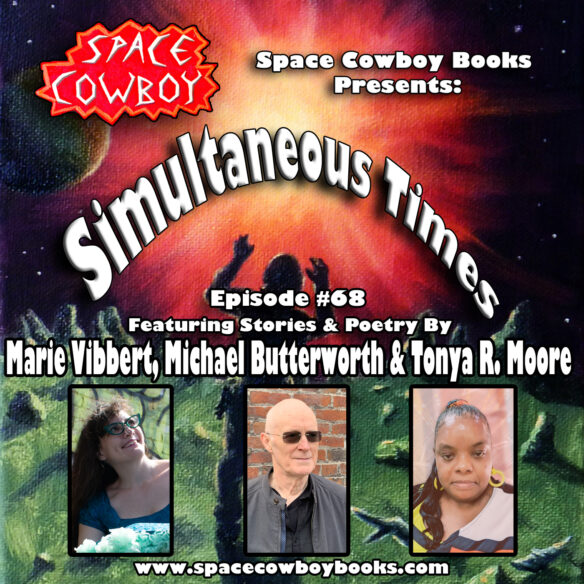
(10) TODAY’S BIRTHDAYS.
[Compiled by Cat Eldridge.]
- Born October 15, 1911 — James H. Schmitz. Writer of short fiction in a space opera setting, sold primarily to Galaxy Science Fiction and Astounding Science-Fiction. His “Lion Loose” was nominated for a Short Fiction Hugo at Chicon III, and The Witches of Karres was nominated for Best Novel at NyCon 3. Sources laud him for his intelligent female characters. His collections and novels are available at the usual suspects. (Died 1981.)
- Born October 15, 1919 — E.C. Tubb. A writer of at least one hundred forty novels and two hundred twenty short stories and novellas, he’s best remembered I think for the Dumarest Saga. His other long-running series was the Cap Kennedy stories. And his short story “Little Girl Lost” which was originally published in New Worlds magazine became a story on Night Gallery. He novelized a number of the Space: 1999 episodes. Somewhat surprisingly he’s never been nominated for or won any awards. (Died 2010.)
- Born October 15, 1923 — Italo Calvino. Writer and Journalist who was born in Cuba, but grew up in Italy. His works range widely across the literary spectrum, across realism, surrealism, and absurdism. As a genre writer he is best known for his “cosmicomics”, linked stories which explore fantastical speculations about subjects such as mathematics, evolution, and human perception. At the time of his death in 1985, he was the most-translated Italian author, and he was recognized with a World Fantasy Award for Life Achievement. (Died 1985.)
- Born October 15, 1926 — Ed McBain. Huh, I never knew he ventured beyond his mystery novels where he was best known for his 87th Precinct novels but he published approximately twenty-four genre stories and six SF novels between 1951 and 1971 under the names S. A. Lombino, Evan Hunter, Richard Marsten, D. A. Addams, and Ted Taine. ISFDB has a list and I can’t say I know any of them. Any of y’all read them? Some are distinctly pulpier in nature such as Find The Feathered Serpent. (Died 2005.)
- Born October 15, 1935 — Ray “Duggie” Fisher. Editor, Conrunner and Fan, who chaired the 1969 Worldcon in St. Louis, was on the committee for several other conventions, and was a founding member of the Poplar Bluff Science Fiction Club and the Ozark Science Fiction Association. His fanzine ODD was a finalist for a Best Fanzine Hugo. His contributions to fandom were, sadly, cut short by his death at age 52 due to complications of diabetes. (Died 1988) (JJ)
- Born October 15, 1942 — Lon Atkins. Editor, Conrunner, and Fan who chaired a DeepSouthCon and was editor of numerous fanzines and apazines, including eight years as co-editor of Rally! He was Fan Guest of Honor at a Westercon, and a recipient of Southern Fandom’s Rebel lifetime achievement award. He was also a ferocious Hearts player. (Died 2016.) (JJ)
- Born October 15, 1954 — Linnea Sinclair, 69. Merging romance, SF and paranormal into, well, damned if I know. She’s here solely because I’m really tickled by the use of her SJW credentials as Games of Command and the short story “Of Cats, Uh, Furzels and Kings” feature telepathic feline creatures called ‘Furzels’. Sinclair has stated that these are inspired by her two cats.
- Born October 15, 1968 — Jack du Brul, 55. A writer of somewhat SF novels that EoSF says of “the Philip Mercer sequence featuring a geologist who – not entirely unlike Steven Spielberg’s similarly scholarly Indiana Jones – has physical gifts extending beyond the probable.” He also co-wrote, and continued after Clive Cusler passed on, The Oregon Files.
(11) COMICS SECTION.
- Thatababy is full of genre cereal trivia.
(12) LEARNEDLEAGUE: SFF ONE-DAY SPECIAL. [Item by David Goldfarb] The LearnedLeague is in its off-season, which as usual means single-topic one-day quizzes. There was one recently about the cartoon Avatar: The Last Airbender. You can read its questions here.
(13) TRIBUTE TO B MOVIE MAKER. “Roger Corman at Beyond Fest: ‘I love making motion pictures’” in the Los Angeles Times.
Beyond Fest and the American Cinematheque saluted producer Roger Corman on [September 30] with a four-film marathon followed by a conversation with some of the directors who began their careers working for the now-legendary genre icon….
…“The vast majority of people can’t tell good from bad,” said [Amy Holden] Jones. “You get notes on cuts that don’t particularly make sense, to get reshoots that aren’t fixing what’s actually the problem. But mainly the executives can’t tell good from bad. And Roger knew it immediately.”
“I’ll never be working for anybody again who knows as much about movies as Roger did when I was starting out,” said Dante, who went on to make the “Gremlins” movies. “Unfortunately, the problem is that the more movies you make, and the more executives you meet, the more you realize that there are almost none who know as much about movies as you do. And so they are no help.
“In fact, they’re a hindrance and you spend a lot of time trying to please people who don’t know what they want,” added [Joe] Dante. “And if they did, they wouldn’t know how to express it anyway. So I think all of us feel that the best years of our creative lives were spent working for somebody who knew more than we did. And that was Roger.”
[Allan] Arkush pointed to Corman when he said, “The profound thing is, this is the only person to run a studio who knows how to make a movie.”…
(14) PARTY LIKE IT’S 1998. “Lost In Space Forever” – a skit with Jonathan Harris and Bill Mumy.
The end of this 1998 documentary features a short skit with Will, Dr. Smith and the Robot on the Jupiter 2.
[Thanks to SF Concatenation’s Jonathan Cowie, Mike Kennedy, Gareth Jelley, Jennifer Hawthorne, David Goldfarb, Steven French, Andrew Porter, Ersatz Culture, John King Tarpinian, Chris Barkley, and Cat Eldridge for some of these stories. Title credit belongs to File 770 contributing editor of the day Andrew (not Werdna).]


